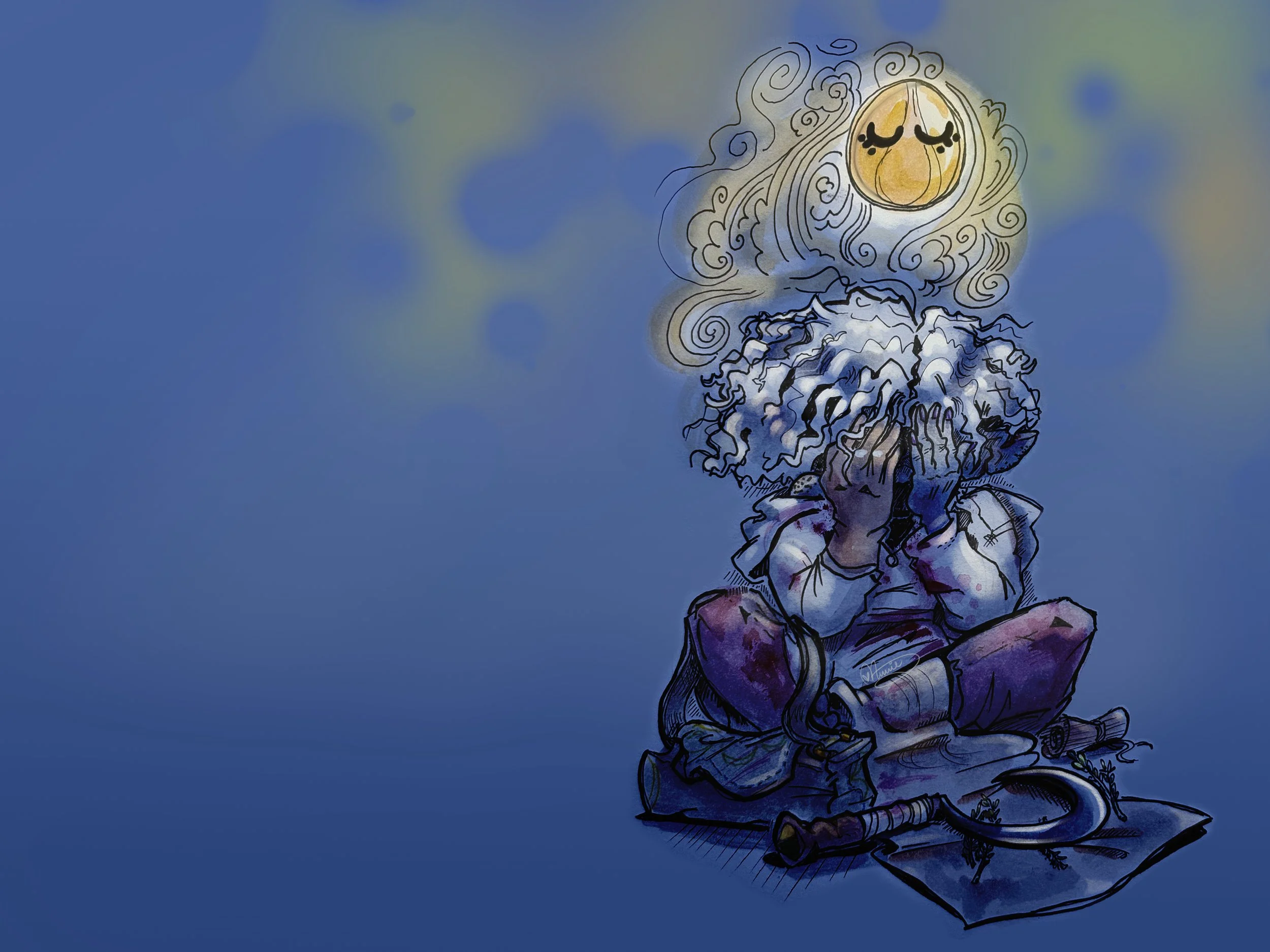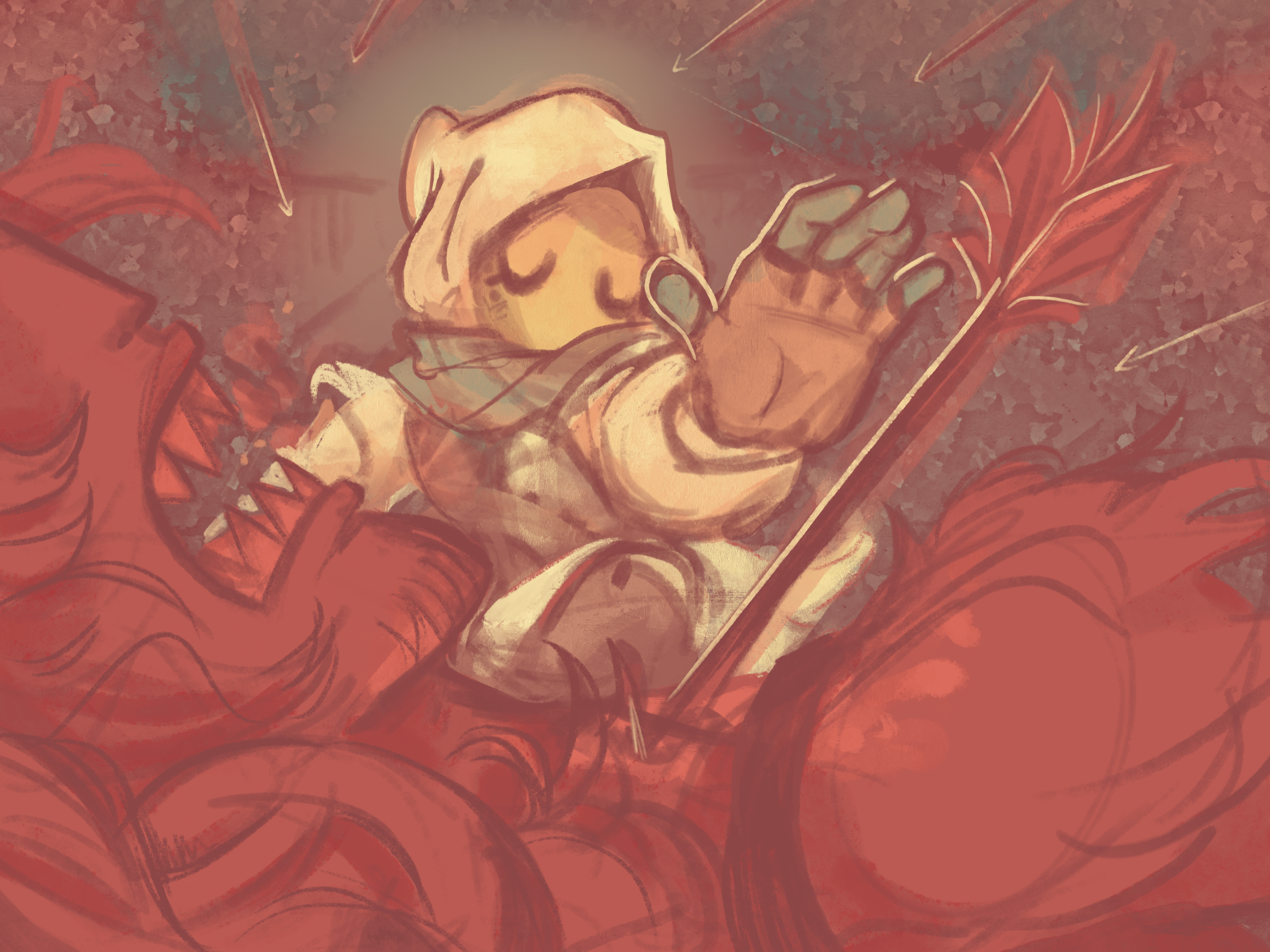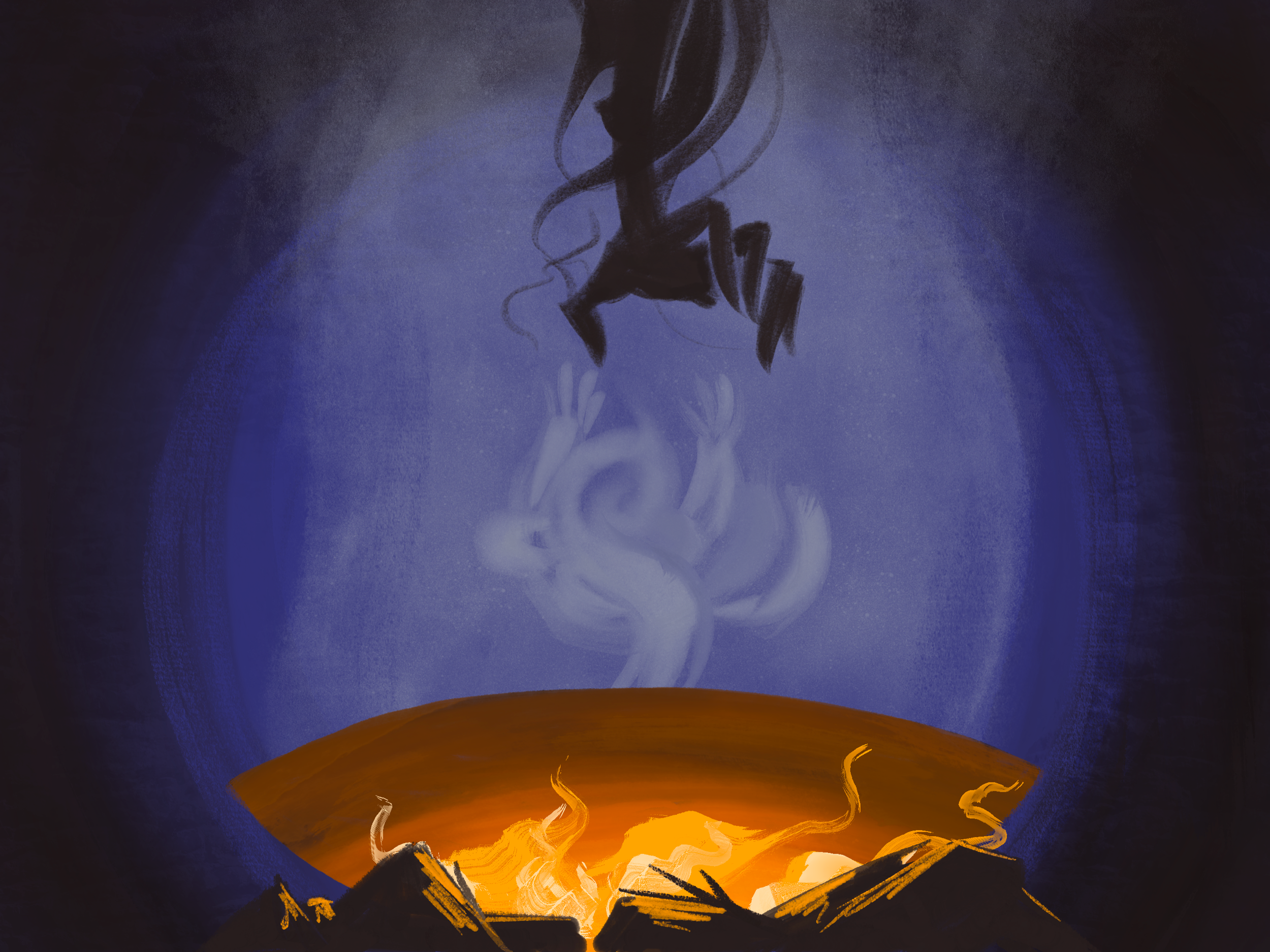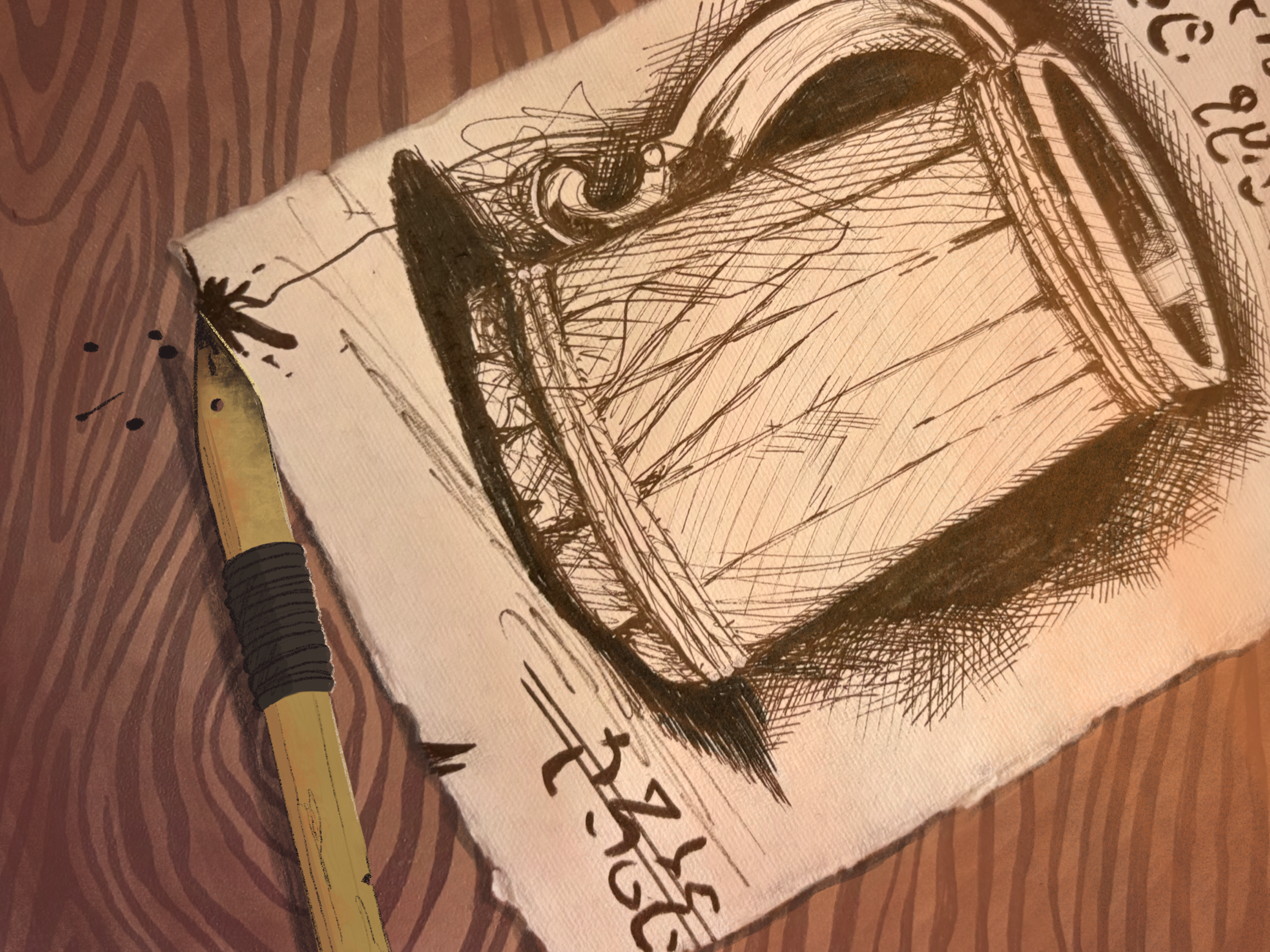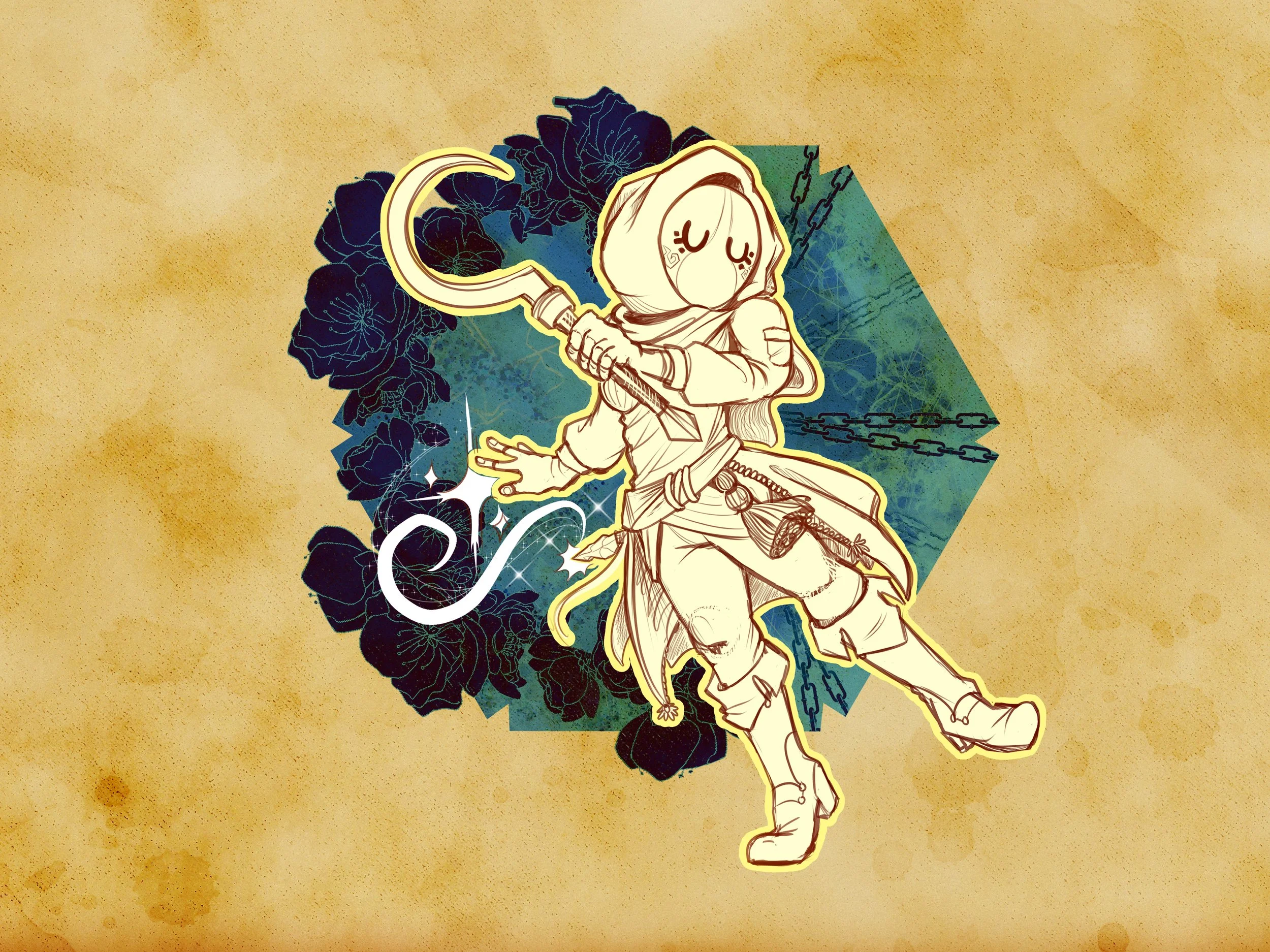Fanesca: Entry Two
Out of all the capable people around to protect… why me?
Second Entry
The bustling, imposing atmosphere of Neverwinter was breathtaking, sure—but somehow, modest little Phandalin caught me off guard just the same. It was a sort of “blink-and-you-miss-it” village, and still it stirred something in me. I suppose when you’ve spent your whole life underground with nothing but stone walls, black eyes and contradicting sermons for company, even an old fence and a dirt road could feel somewhat remarkable.
The Messengers used to recruit outsiders now and then—strangers who’d catch a glimpse of me and know something wasn’t right. A few were stupid (or kind) enough to speak up when they saw me punished. They’d vanish soon after. No one ever said what happened to them. And I knew better than to ask. But even in their silence, they proved something to me: that goodness wasn’t a fantasy, that people could care without being told to.
I wonder if they’d recognize me now: above ground, alive, armed, and no longer kneeling to anyone.
I hope they somehow see me. I hope they know they weren’t wrong to try.
My eyes never stopped moving. I studied each of my traveling companions—how they spoke, how they walked, where their eyes drifted when they weren’t thinking. I scrutinized whatever I could to make sure I would grow close enough to this temporary hedge of protection. I kept my steps quiet and my posture low, smallness coming as naturally to me as breath. But as long as I walked close to them, I doubted anyone could even see me.
Syldithas was practically a tower. Nearly seven feet of scaled, muscled might. Finnegan was everything I ever imagined a human would be—six feet of bright, quick-witted confidence. Ragar, despite being small for a bugbear, still had a good two feet over me, and Raph’æl, as a full-blooded high elf, just short of her by two inches.
I thought that meant that my svirfneblin self would be the shortest of the lot. That was, until I remembered Super.
He had stowed himself in a pickle barrel full of brine for the entire trip to Phandalin. When we finally arrived, the frog-like grung monk popped the lid, leapt out and stretched like a cat in a sunbeam, his greenish, glossy head just barely clearing my eyeline as he did. I’d actually forgotten he was traveling with us. He’d slept through the ambush in the woods without so much as a croak. When he noticed the arrows embedded in the side of his “lodging,” he simply muttered, “…huh,” and waddled off to help us track down our employer.
I don’t understand him. I don’t think any one of us does. But for some reason, his presence—so utterly detached and unshaken—makes the group feel more real? Like we’re not just temporary allies on borrowed time. Although that wasn’t something I was particularly desiring at the time, it was… cozy.
The townmaster was a man of clean clothes and an extravagant dagger-lined belt—no calluses on his hands, but clearly someone who liked to pretend he’d earned the right to carry steel. He greeted us with thin civility, though he kept mispronouncing Syldithas’ chosen name. I couldn’t tell if it was ignorance or intention—he claimed he’d met Syldithas’ brother once, but the way his eyes slid off his Dragonborn scales made me suspect something less… kind.
Syldithas didn’t seem surprised. Just quietly resigned. He brushed it off the same way he does most slights, like swatting off a persistent fly. Still, I found my fists curling behind my back. I said nothing. I’m used to silence. It’s easier to carry discontent there, where it can’t spill out and stain anyone.
Raph’æl and Ragar broke off to check the armory for spare gear. I let them go without comment and slipped away toward the edge of the square. The streets weren’t bustling, but there was enough life here to feel unfamiliar: a pair of children chasing a dog through puddles, a merchant arguing with a farmer over apples, a blacksmith too busy to look up from their work. The natural flow of the village.
It was all so comfortable. In a strange and foreign way.
Is this… “normal?”
I didn’t think I would ever fully understand normal.
I wasn’t after anything in particular as we wandered through the streets of Phandalin separately—beyond locating Gundren Rockseeker, our employer. But something near the center square caught my eye and pulled me to a halt.
A shrine. Or what passed off for one. It didn’t match the rest of the buildings. It somehow appeared old but new all at once— not matching surrounding architecture, but built up with weathered stone. At its entrance, a sigil was carved in the stone. One I recognized far too well: the holy symbol of Tymora, Lady Luck.
I froze. My sleeves suddenly felt too tight. Beneath them, the raised scars of that same symbol—along with those of a dozen other gods—itched like fresh burns. They carved them into my skin in the name of faith, in the hope that some divine power would finally answer their cries through me. Tymora had been a favorite among the more maternal cultists. Especially the nuns and Matron Nehra. The women tended to be more attracted to the passive rituals. Eldath, Deneir, Tymora, Lliira… none of the gods that subjected me to painful blood rites and gauntlets. I suppose it let them sleep through the night better.
But despite years of pleading, luck never came. For them or for me.
I didn’t stumble into freedom. I had to tear salvation open with my own hands.
I glared at that shrine for longer than I’d care to admit. Then I turned away. If my face had been exposed, I would have spat upon the ground.
She did nothing for me. She doesn’t deserve my reverence.
I sat upon a stone and looked around for a bit. Just watching. Breathing. Taking in the weight of a place that didn’t scream, chant, or demand. No rituals. No overseers. No punishments.
And then I heard Raph’æl’s voice cut across the square—urgent and steady, asking us all to gather round. Him, Syldithas and Ragar had returned from the armory wearing grimaces. “Gundren never made it,” Ragar spoke up sharply. “We’re heading back.”
Just like that, the quiet was gone. Duty calls. I turned on my heel, pulled my cowl tighter, and followed them all without a word.
———
We rode in silence for a while. I used the time to update my field notes—just a few sparse lines about the layout of the town, the townmaster’s demeanor, and a brief mention of Raph’æl and Ragar’s interaction before we departed. There was something in the way they stood shoulder to shoulder that caught my attention. Raph’æl’s voice had rung clear when he called for us, calm and resolute, but his eyes—his eyes betrayed him. There was a tremble in them, distant and aching, like he’d already imagined the worst and was bracing for it. Ragar, by contrast, looked like she’d seen this sort of mystery unfold a dozen times before. Her eyes were half-lidded, unreadable. The healer had drawn in a breath and parted his lips, about to frame the story with the weight it deserved, but Ragar cut him off and spilled it all in two short sentences before striding toward the cart. No room for comfort. No time for ceremony. Just facts, and forward.
The forest hadn’t changed. The wheel ruts, the split ferns, even the broken shaft of the arrow that had missed Finnegan by inches—everything was just as we’d left it. Yet stepping out of the cart made it feel like the air had grown thicker, heavier. This was no longer just a place where we had been attacked. It was now a place marked by what we missed.
I stayed behind the others as they spread out to examine the area again. Raph’æl knelt where the overturned crates had been, fingertips brushing the dirt as if hoping the earth itself would whisper answers. Ragar crouched at the treeline, eyes narrowed, sniffing faint traces of disturbed foliage and footprints. Syldithas, oddly quiet, ran a hand along the gouge in the bark where a crossbow bolt had splintered it. Even Super had emerged from his barrel to peer around, one brow cocked in idle curiosity.
I said little. Just observed. My notes stayed tucked away—there was nothing here I hadn’t already recorded, nothing new but the quiet. No scavengers had come. No signs of wildlife reclaiming the wreckage. It was as though the clearing had been waiting for us to return.
We knew what it meant: Gundren had never made it past this place. Someone had taken him, and they’d been precise enough to leave very little of him behind.
The trail was crude, but unmistakable. Ragar followed it like she’d walked it a hundred times before—grunting her way past thickets and dragging branches aside for the rest of us. I don’t think she said a word the entire time, but none was needed. This was the kind of pursuit she seemed to be built for.
The cave came into view just as the sun dipped lower. Moss covered the rocks and water poured out from its mouth in a steady stream, icy and loud. That’s when Super spotted him: a goblin guard, twitchy and underfed, perched on a rock with a crude spear and a worse attitude.
His name was Smeak.
We didn’t fight. We fed him.
Dried meat and false promises passed between us like currency, and suddenly, we were guests.
Super and I entered first.
He moved through the current like it was bathwater. I pressed against the damp walls, breathing slowly, ignoring the cold leeching through my gloves. We split up. That wasn’t the plan—but Super doesn’t follow plans so much as drift through them.
I struck first. A flash of lightning—reflexive, almost casual. The goblin didn’t even scream. His body floated past the others, which was the first clue that reached our team outside. Then came the roar of rushing water. They’d dammed the stream. The flood nearly took me—nearly. I held fast to a jagged edge in the rock, fingers burning, soaked but upright. Super, of course, blinked water out of his eyes and kept moving like nothing happened. The others rushed in soon after.
The real fight began.
Goblins of all colors and sizes poured out of the tunnels like ants, but we held our ground.
Then he came.
Clarg, he declared himself as he swore to usher us to our downfall. He was a bugbear twice my height and easily three times my weight, wielding a Morningstar that could have shattered bone into dust. I had walked too far into the cave. He set his eyes on me, stunning me into indecision. I braced. There wasn’t time to think, let alone reach for a weapon. But before he could swing…
Raph’æl was there.
I didn’t even hear him coming.
His scimitar—he had one all along?—sliced clean into Clarg’s shoulder. Then he turned to me, and without another word, united his wrists in clerical supplication and casted Sanctuary. A divine shimmer washed over my skin. Clarg’s blow missed entirely and magically redirected toward Raph’æl.
I couldn’t move.
Watching him catch that Morningstar on his blade—it was like time slowed. The steel twisted in his grip, the impact echoing in my ribs. His weapon clattered away. He stumbled to the ground, exposed. In danger. All because he protected me. I reacted without thinking. I tried to throw myself between the two of them, arms spread, shaking far too intensely to perform another action.
It was foolish. Instinctual. Desperate.
Ragar saved us both.
She lunged from the shadows, drove her blade deep into Clarg’s gut, and ended him with brutal finality. Viscera trickled towards the ground and red painted the cavern ceilings. She carved. She yanked. Then she raised his severed head high, barking something triumphant in goblinspeak. The surviving goblins broke, weapons thrown to the ground in a metallic cacophony.
It was over.
But all I could look at was Raph’æl—breathing hard, brow bloodied, and smiling at me.
As if I had done anything of note when I had nearly been the culprit of his demise.
What a lovely fool.
The cave grew quiet far too quickly for a place that had echoed with snarls and steel just moments prior. Blood—ours and theirs—slicked the floor in streaks and pools, and the only thing louder than the dripping water was the drumbeat of my heart finally slowing.
Gundren wasn’t here.
Instead, we found his bodyguard and close friend—Sildar. He was beaten, but alive. When he finally spoke, his words were slow from pain, but clear: Gundren had been taken. A fortress not far from here, overrun and fortified by something far worse than goblins.
The name Cragmaw Castle lingers in my mind like a warning.
We didn’t press on right away. Even Syldithas and Ragar agreed to stop. We’d exhausted ourselves, and I had no magic left to spare. I had used it to heal critical wounds. We couldn’t risk storming a castle in our condition.
Instead, we did something unexpected: we stayed.
The goblins, leaderless and disoriented, had little fight left in them. Ragar filled that void with ease, holding Clarg’s severed head aloft like a banner and declaring herself their new chief. They didn’t challenge her. Perhaps they feared her—or perhaps, in some strange way, they respected her.
So we remained in the cave for the evening. Not just to rest, but to build something. Rapport. Trust. A shared goal.

